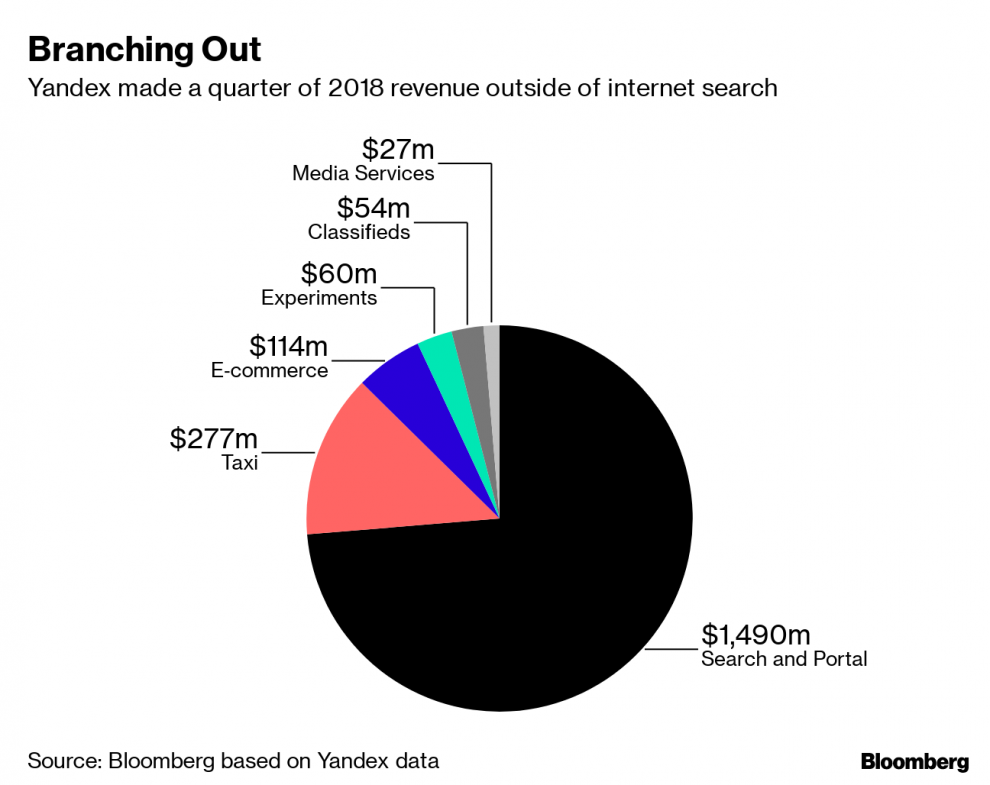
(Bloomberg) — I’m woken up by an alarm on a home speaker designed by Yandex NV. I go to work in Yandex taxi listening to the company’s music-streaming service. My lunch is delivered by Yandex.Eats. I buy sneakers on the company’s Beru marketplace, and catch up on a series on its Kinopoisk smart-TV app in the evening.
You get the picture. Not so long ago, most decisions in Russia were decided by the state. Now, Russia’s largest tech company can cater to your every need.
A tech company attempting to offer a range of services to keep users attention is not new. Amazon.com Inc. and Alphabet Inc. have been launching new business from internet balloons to healthcare. But few offer the breadth of services offered by Yandex.
Five years ago, Yandex was just a search engine trying hard to fend off Google in its local market. Since then it has bought Uber Technologies Inc.’s Russia business, built its voice assistant into cars and home appliances, and more than doubled its revenue. Yandex now claims to have 108 million monthly users, which is about 75% of Russia’s population.
Yandex’s expansion — still focused almost entirely in Russia — has allowed it to gather significant amount of data on its users, who have to log into each service using the same ID. This has allowed Yandex to offer highly personalized services. In Yandex’s car-sharing app, the dashboard welcomes you by name, turns on your favorite music and maps a route to your home.
At a time where tech giants are attempting to convince users they take privacy seriously, Yandex’s Chief Financial Officer Greg Abovsky argues that, despite having expanded to multiple services, it doesn’t know much more about its users than Google does (which could be argued is a lot).
“To respond to users’ personal needs, we need not only the data that you tell Yandex directly – like your name and age – but also technical data, including cookies, IP-addresses and GPS coordinates,” said Abovsky. “It’s important that these data are processed in anonymized form and automatically – no one can get access to it.”
Perhaps unsurprisingly, Yandex’s user data has attracted the attention of the Russian government. The company’s email and cloud-storage services are deemed “information-dissemination operators,” and monitored by communications watchdog Roskomnadzor, while a 2016 law required internet service providers and mobile telephone operators to store records of users’ online activities for up to six months.
Russian authorities also have a legal right to request all your data stored by Yandex — whom you sent e-mails to, what files you downloaded and possibly everything else linked to your user ID. So far, Yandex has pushed back against government demands to turn over encryption keys that would allow the security services to monitor users’ private data.
“These additional data it has on users may become important pieces of the puzzle for some advertisers or law-enforcement agencies,” said Artem Kozlyuk, head of Roskomsvoboda, a civil-rights lobby group.
Yandex’s growth has also led it to shed the role of tech underdog. Back in 2015 it complained to Russia’s antitrust watchdog that Google was abusing its dominance on mobile devices, arguing that Google required phone makers to install a bundle of its services as a pre-condition. Yandex eventually won the case.
Now, Yandex is bundling its own services. Last year it introduced Yandex.Plus – somewhat similar to Amazon Prime. Users subscribe to Yandex.Music for $2.69 a month, also gaining access to Yandex’s online-cinema Kinopoisk and discounts for Yandex.Taxi, car-sharing, Beru marketplace and cloud storage. Over 2 million people already use Yandex’s paid subscriptions, most of them via the bundle.
When asked if this puts competition for smaller music, ride-hailing or other apps at risk, Abovsky responded: “No. It’s a commercial bundling. We don’t force it on others, consumers are willing to buy or not to buy our bundle. It’s incorrect to compare this with Google’s bundling when they forced phone makers to pre-install only Google services and no one else’s.”
A few years after shifting from a search engine to a tech company, Yandex is still looking to maintain its rapid growth, with user data at the heart of its business model. Revenue has more than doubled from 60 billion rubles in 2015 to 128 billion rubles ($2 billion) last year.
Yandex already makes almost 30% of its revenue outside of internet search. Yandex is now seeking to take on traditional TV. From May, it started selling Module, a $32 device similar to Google’s Chromecast that’s plugged into a TV-set, so that users can watch Yandex.Live streaming channel with content personalized for them, instead of regular TV channels.
Yandex has been experimenting with creating its own social network and messenger, but without much success, Abovsky admits. But Yandex.Zen — a personalized content feed, may make over $100 million revenue this year, he said.
“Painters polish their skills by copying other painters,” said Abovsky. “The same happens in tech, that’s how progress makes its way.”
To contact the reporter on this story: Ilya Khrennikov in Moscow at [email protected]
To contact the editors responsible for this story: Giles Turner at [email protected], Torrey Clark
<p class="canvas-atom canvas-text Mb(1.0em) Mb(0)–sm Mt(0.8em)–sm" type="text" content="For more articles like this, please visit us at bloomberg.com” data-reactid=”68″>For more articles like this, please visit us at bloomberg.com
©2019 Bloomberg L.P.






